
Best Automotive Air Compressors of 2025
If you work with cars, you know the value of a good air compressor. After all, it's what powers the tools you need for the job, from sandblasters to paint sprayers and more. That's why we made dedicated picks for the best automotive air compressors that will improve your productivity.
Click on each automotive compressor below to view the product page filled with more features, specs, reviews, and other great resources. Be sure to also check out my selection criteria for these compressors.
The Best Automotive Air Compressors
| Best Air Compressor for Automotive Shop | Best Air Compressor for Home Shop | Best Air Compressor for Painting Cars | Best Air Compressor for Car Detailing | Best Air Compressor for Sandblasting Cars |
|---|---|---|---|---|
|
|
|
|
|
|
Best Air Compressor for Automotive Shop: EMAX ESP10V120V1
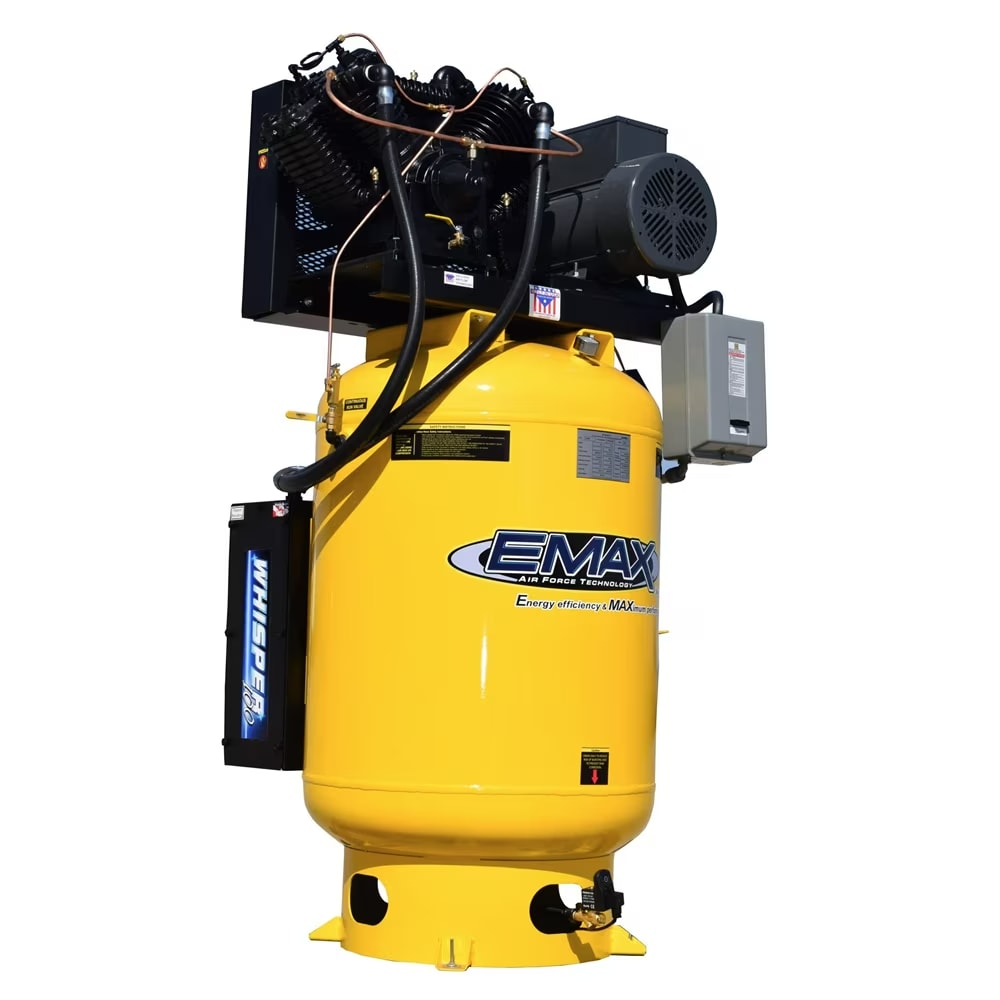
The EMAX ESP10V120V1 two-stage air compressor is loaded with all the features needed for most automotive shops. For one, let’s talk about space. Its vertical, 120-gallon tank will keep a low profile in your crowded shop. Plus, its patented Silent Air Technology reduces decibels by up to 35%, so you won’t be adding much extra noise to the mix.
Now, let’s talk power. The pressure-lubricated two-stage cast-iron pump with dual control design allows for automatic or continuous run. The 10-horsepower motor includes a magnetic starter and runs on a low RPM of 1750, which reduces heat and wear. You’ll get 38 CFM at 100 PSI and a maximum PSI of 175.
This EMAX compressor is rated at up to 70,000 hours of operation thanks to its durability. Air Stream Technology reduces moisture, a built-in intercooler and aftercooler cools the air between and after compression stages for better performance, and a belt tension adjuster reduces vibration and extends belt life. In addition, the EMAX has a raised pump mounting platform that allows for a constant flow of cool air from the flyweel fan around the pump crankcase, ensuring cooler pump oil temperatures and keeping heat off the pistons and connecting rods. There’s also an electronic air valve that automatically removes condensate from your air system, saving time and money on maintenance.
I recommend the EMAX ESP10V120V1 for any professional auto shop, but also for farm shops and industrial applications. You can even get an extended 5-year warranty on the compressor and an extended limited lifetime warranty on the pressure-lubricated pump, which is rare in the industry. It’s truly a rare combination of power, efficiency, and value that will be a major asset to your business.
| Spec | Details | Rating |
|---|---|---|
| Power | 38 CFM @ 100 PSI; 175 PSI maximum; 10-horsepower, 208-230-volt single-phase AC motor | |
| Reliability | Rated at up to 70,000 hours; 5-layer filtration reduces moisture; Pressure-lubricated pump; Low 1750 RPM design reduces wear; Electronic drain valve; Cast-iron pump; All-steel connecting rods | |
| Efficiency | Raised pump platform improves airflow; Dual control pump design allows for automatic or continuous run; Operates 35% cooler than competitors; 120-gallon tank; Built-in aftercooler | |
| Noise | Average 62 dBA | |
| Overall Value | Powerful, well-built pump loaded with efficiency features that'll serve your shop for years |
Who It's For:
- Automotive Shop Owners
- Agricultural Professionals
- Commercial Users
Who It's Not For:
- Homeowners
- Hobbyists
Runner Up: Schulz 932.9341-0
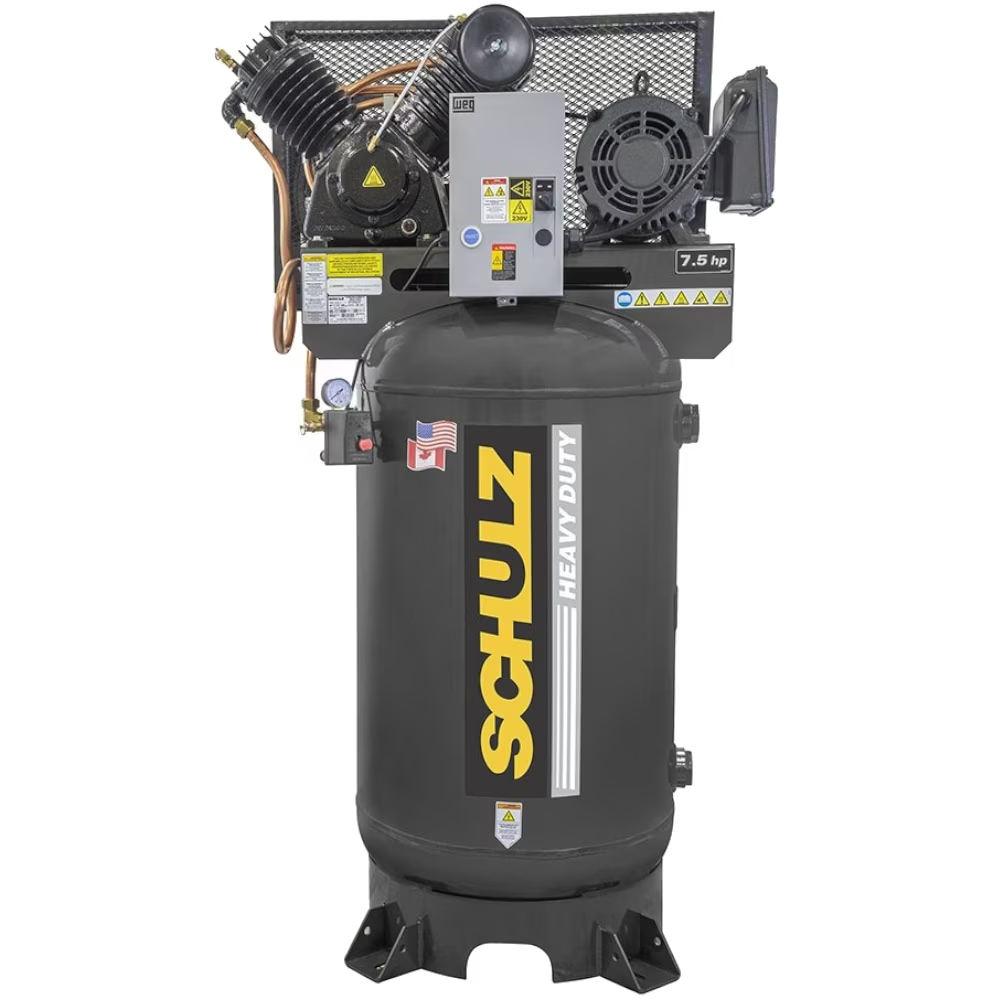 The Schulz 932.9349-0 two-stage air compressor is a great bang for your buck and my runner-up pick for automotive shops. Its reliable 7.5-horsepower WEG motor is made in the U.S.A. and puts out 20.1 CFM of airflow at the maximum PSI of 175. The V-Series cast-iron pump runs cooler and lasts longer than competitors due to the space between each cylinder. Oversized main bearings and Swedish Steel valves provide additional durability. You'll have plenty of airpower to tackle all your commercial auto shop needs.
The Schulz 932.9349-0 two-stage air compressor is a great bang for your buck and my runner-up pick for automotive shops. Its reliable 7.5-horsepower WEG motor is made in the U.S.A. and puts out 20.1 CFM of airflow at the maximum PSI of 175. The V-Series cast-iron pump runs cooler and lasts longer than competitors due to the space between each cylinder. Oversized main bearings and Swedish Steel valves provide additional durability. You'll have plenty of airpower to tackle all your commercial auto shop needs.
Best Air Compressor for Home Shop: Quincy QT-54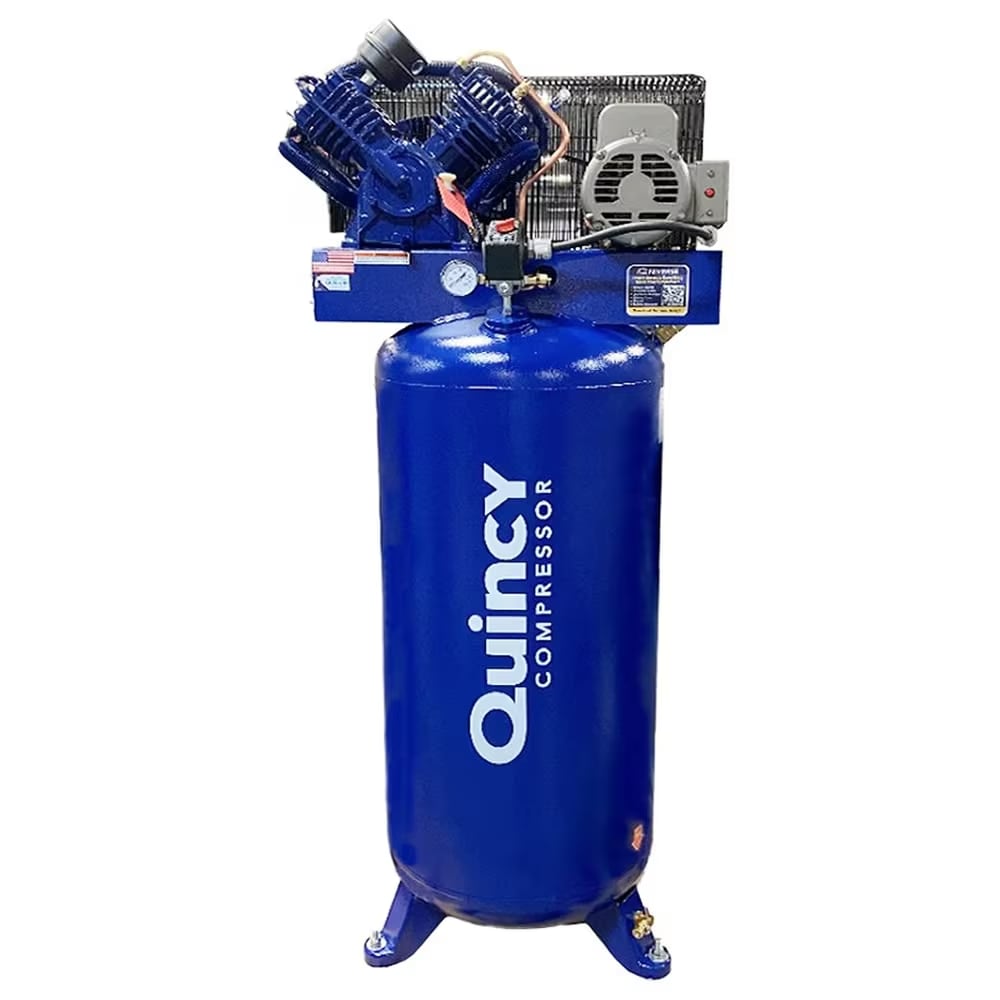
Some people run a professional workshop out of their home garage where they work on vehicles. If you’re one of them, then you’ll likely want the power and reliability of a two-stage air compressor like the Quincy QT-54. It's one of the toughest air compressors I’ve ever seen.
Get 15.2 CFM of airflow at 175 PSI for all your home workshop needs. From impact wrenches and grinders to air hammers and paint sprayers, the Quincy powers it all.
The rugged design components include a cast-iron flywheel and cylinders, an industrial motor, an aluminum head, a two-piece connecting rod, stainless-steel reed valves, a four-ring piston, industrial-class bearings on both ends of the crankshaft, and graphite gaskets. Plus, polyester air filters weed out 10 – 50 times more contaminants than standard paper or foam filters. All of these components combine to boost durability, efficiency, and lifetime. In fact, you’ll get a whopping 50,000+ hours out of the pump.
Although you’ll spend more money upfront on this Quincy unit, you’ll be paying for what could be the last air compressor you ever need to buy, thanks to its reliability. You can also get a three-year extended warranty on the pump just by purchasing a maintenance kit with the unit. To me, that’s money well spent.
| Specs | Details | Rating |
|---|---|---|
| Power | 15.2 CFM @ 175 PSI; 5-horsepower 230-volt single-phase AC motor | |
| Reliability | Cast-iron cylinders & flywheel; Aluminum head; Heavy-duty industrial motor; Stainless-steel reed valves; Graphite gaskets; Polyester air filters; Industrial-class bearings; Four-ring piston; 50,000+ hour pump life | |
| Efficiency | Low RPM; High-efficiency finned tube intercooler | |
| Noise | Estimated 80 - 90s dBA | |
| Overall Value | Durability, durability, durability. This could be the last air compressor you need to buy! |
Who It's For:
- Home Shopowners
- Professionals
- Small Business Owners
- Hobbyists
Who It's Not For:
- Typical homeowners
Runner Up: MAXair C5160V1-MAP
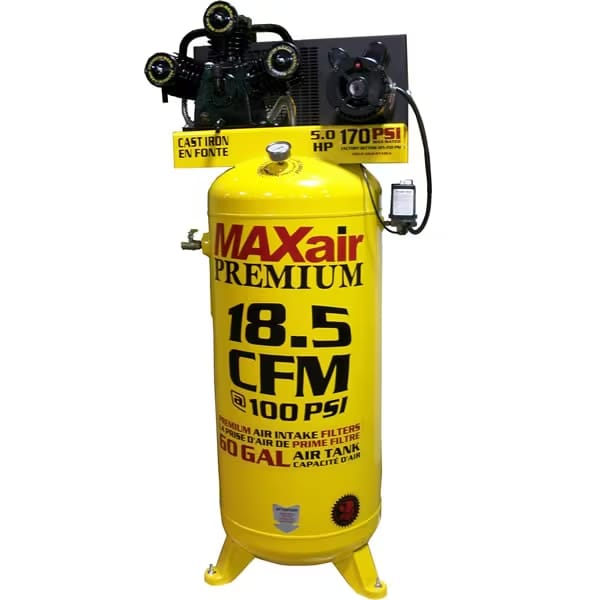 For those starting a business out of their home, this MAXair compressor is a fantastic runner-up. It provides 18.5 CFM at 100 PSI and has a 60-gallon tank. Rugged cast-iron cylinders and metal air filters work to protect the compressor and extend its life. I recommend this unit, particularly if you only plan on using air tools for a few hours per day, a few days per week. Plus, it comes with a two-year warranty that can be extended to three years with the purchase of a maintenance kit.
For those starting a business out of their home, this MAXair compressor is a fantastic runner-up. It provides 18.5 CFM at 100 PSI and has a 60-gallon tank. Rugged cast-iron cylinders and metal air filters work to protect the compressor and extend its life. I recommend this unit, particularly if you only plan on using air tools for a few hours per day, a few days per week. Plus, it comes with a two-year warranty that can be extended to three years with the purchase of a maintenance kit.
Best Air Compressor for Painting Cars: Ingersoll Rand 2475N7.5-P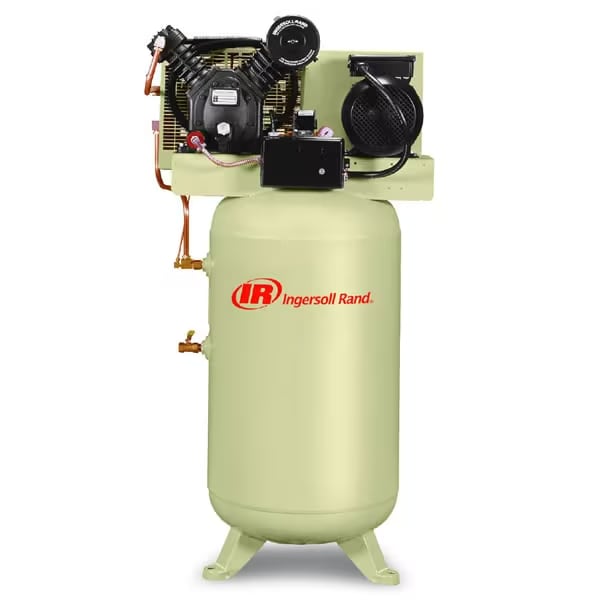
For car painting jobs, I recommend the Ingersoll Rand 2475N7.5-P two-stage air compressor, thanks to its large capacity, enhanced air quality, and reliability. Its 7.5-horsepower, 230-volt AC motor includes a magnetic starter and can produce 24 CFM of airflow at 175 PSI. Designed for continuous duty operation, this compressor will handle whatever you throw at it in a day’s work. Most importantly for painting, the 2475N7.5-P keeps the air dry thanks to its aftercooler.
This compressor’s power is matched only by its reliability. The cast-iron pump is designed for over 15,000 hours of trouble-free use. V-Block deep-finned cylinders provide 360-degree cooling for lower operating temperatures. A low-oil-level shutdown switch protects the pump, and an electronic drain valve automatically removes condensate. Reliable oversized bearings and a cast-iron balanced belt wheel provide additional sturdiness, while stainless steel reed valves are optimized for increased volumetric efficiency. Finally, a one-piece connecting rod with fewer wearing parts simplifies maintenance.
The Ingersoll Rand 2475N7.5-P is perfect for automotive service, machine shops, production lines, car washes, and repair shops. It’s OSHA-compliant and UL/CSA certified. Plus, you can extend the warranty by one year if you buy a maintenance kit with the unit. Don’t mess around with anything less for your car painting jobs.
| Specs | Details | Rating |
|---|---|---|
| Power | 24 CFM @ 175 PSI; 7.5-horsepower, 230-volt single-phase AC motor | |
| Reliability | Rated for over 15,000 hours; Air-cooled aftercooler reduces moisture; Cast-iron cylinders & pump; Reliable oversized bearings; OSHA-compliant; UL/CSA certified; Automatic Drain Valve | |
| Efficiency | Continuous-duty operation; V-Block deep finned cylinders provide 360° cooling for lower operating temperature; 80-gallon tank | |
| Noise | Estimated 80 - 90s dBA | |
| Overall Value | A good compressor with a proven ability to meet your commercial air needs for years |
Who It's For:
- Automotive Shop Owners
- Commercial Users
Who It's Not For:
- Homeowners
- Hobbyists
Runner Up: Puma TUE-7580VM
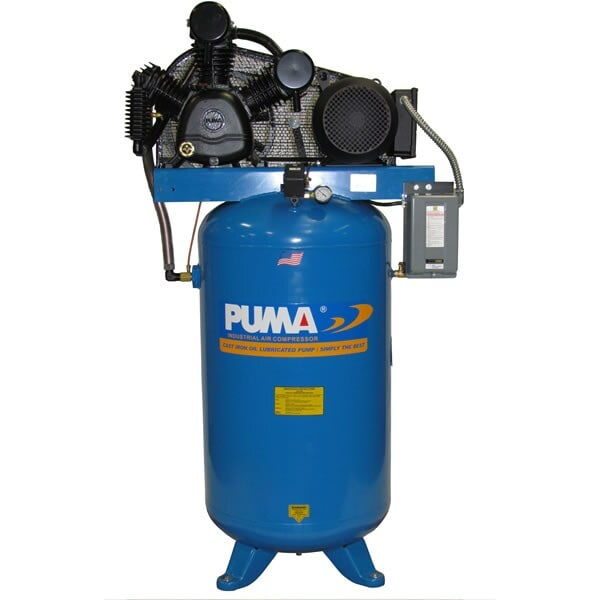 My runner-up pick is the Puma TUE-7580VM two-stage air compressor. It's a great, budget-friendly option for start-up paint shops and can handle multiple tools simultaneously. The 7.5-horsepower motor provides 22 CFM of airflow at 90 PSI and a maximum PSI of 175. A V-type pump runs cooler and works longer with less vibration, and a magnetic starter protects the compressor from overloading. With the Puma, you'll manage to run commercial and light industrial air applications for years to come.
My runner-up pick is the Puma TUE-7580VM two-stage air compressor. It's a great, budget-friendly option for start-up paint shops and can handle multiple tools simultaneously. The 7.5-horsepower motor provides 22 CFM of airflow at 90 PSI and a maximum PSI of 175. A V-type pump runs cooler and works longer with less vibration, and a magnetic starter protects the compressor from overloading. With the Puma, you'll manage to run commercial and light industrial air applications for years to come.
Best Air Compressor for Car Detailing: Quincy QT Pro Air Compressor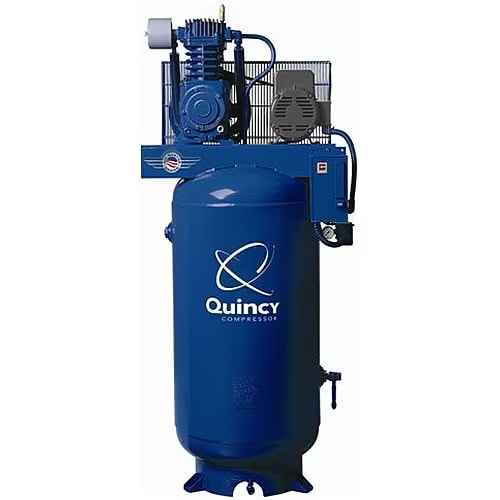
The Quincy QT Pro two-stage air compressor is perfect for car detailing but offers flexibility for use with other automotive applications. Detailing requires precision, and you’ll get that with this compressor. The 7.5-horsepower 230-volt AC motor provides 22.6 CFM of airflow at 175 PSI.
You’ll also get great efficiency out of this unit thanks to its cooling features. The aluminum head optimizes heat dissipation, and the finned tube intercooler provides maximum cooling between compression stages. A large balanced cast-iron flywheel further enhances cooling with its angled shape.
What most stands out to me is the industry-leading pump life of more than 50,000 hours, made possible by its durable cast-iron construction, industrial-class bearings, and graphite cylinder and head gaskets. The low-RPM motor reduces wear and tear, while stainless-steel reed valves resist corrosion. A magnetic starter safely starts large loads.
Best of all, the Quincy QT Pro is proudly made in the U.S.A. and has the backing of a company with more than 100 years of proven air compressor experience. The icing on the cake is the option to extend the one-year factory warranty to three years just by purchasing a maintenance kit with the compressor. It’s one of the best investments you can make for your automotive shop.
| Specs | Details | Rating |
|---|---|---|
| Power | 22.6 CFM CFM @ 175 PSI; 7.5-horsepower, 230-volt single-phase AC motor | |
| Reliability | Aluminum head helps heat dissipation; Cast-iron cylinders & flywheel; Stainless-steel, corrosion-resistant reed valves; Industrial-class bearings; Graphite cylinder and head gaskets; Magnetic starter | |
| Efficiency | 50,000+ hour pump life; Angled flywheel maximizes cooling; High-efficiency finned tube intercooler; Heavy-duty motor runs low RPMs | |
| Noise | 75-82 dBA | |
| Overall Value | Quality compressor built in the U.S.A. that will keep your commercial operation running for years |
Who It's For:
- Automotive Shop Owners
- Car Wash Business Owners
- Commercial Users
Who It's Not For:
- Homeowners
- Hobbyists
Runner Up: Campbell Hausfeld CE7000
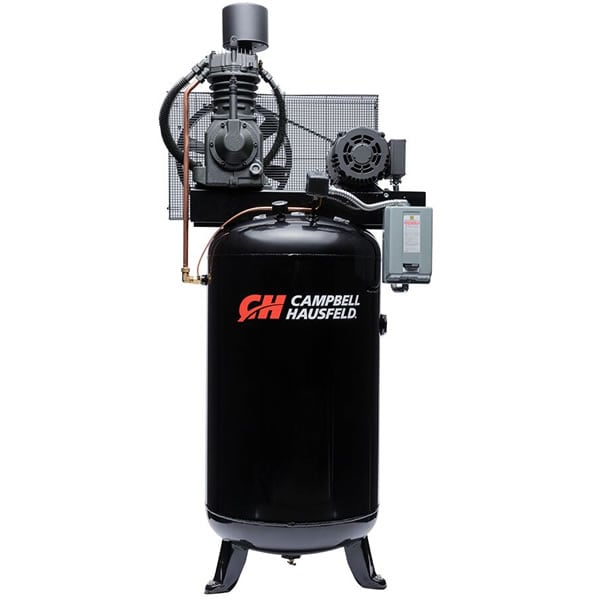 For car detailing, my runner-up pick is the Campbell Hausfeld CE7000 two-stage air compressor. Airflow delivery is 24.5 CFM at a maximum 175 PSI, and a built-in aftercooler removes heat and moisture from the compressed air to optimize performance. Expect up to 15,000 hours or more of pump life thanks to durable stainless-steel valves, a ductile iron crankshaft, and low pump RPM operation. Count on this compressor for many, many detailing projects.
For car detailing, my runner-up pick is the Campbell Hausfeld CE7000 two-stage air compressor. Airflow delivery is 24.5 CFM at a maximum 175 PSI, and a built-in aftercooler removes heat and moisture from the compressed air to optimize performance. Expect up to 15,000 hours or more of pump life thanks to durable stainless-steel valves, a ductile iron crankshaft, and low pump RPM operation. Count on this compressor for many, many detailing projects.
Best Air Compressor for Sandblasters: DeWalt DXCMV5048055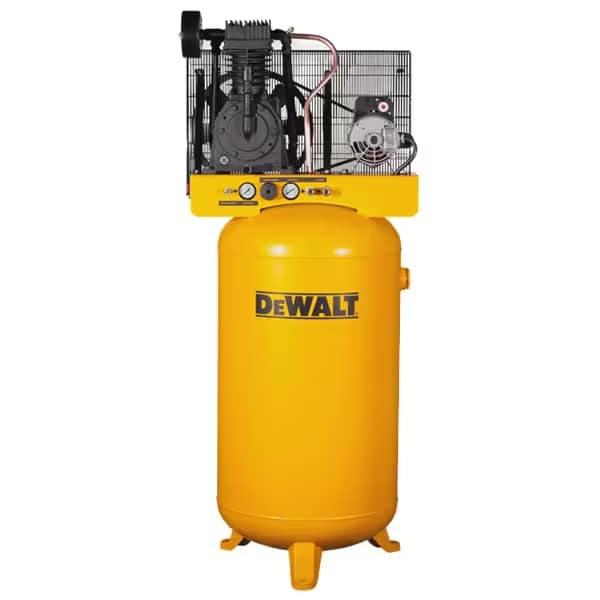
Sandblasters require a hefty dose of power to work effectively. You’ll get it with the DeWalt DXCMV5048055 5-horsepower, 80-gallon air compressor. Mustering 17.9 CFM at 100 PSI and a maximum PSI of 175, this compressor provides the airflow and pressure you need for the toughest sandblasting jobs.
It’s also built to last. Cast-iron pump and flywheel construction prepare this compressor for the trenches. The flywheel features large fins for lower RPM, which improves cooling and extends pump life. An integrated control panel includes a large tank and output pressure gauges for clear readings. You’ll also get easy access to a pressure regulator and two quick-connect air outlets for your tools. The 230-volt AC motor includes thermal overload protection from voltage fluctuations, eliminating the need for a separate magnetic starter.
Overall, this DeWalt compressor is a perfect addition to body shops, cleaning and restoration businesses, and other applications using a sandblaster. It’ll run as needed, off and on, for five days a week. Plus, you'll double the two-year warranty to a four-year warranty by purchasing and using the maintenance kit. The initial investment is definitely worth making.
| Specs | Details | Rating |
|---|---|---|
| Power | 17.9 CFM @ 100 PSI; 175 PSI maximum; 5-HP, 230-volt single-phase AC motor | |
| Reliability | Cast-iron pump & flywheel; Deep groove cooling fins; Thermal overload protection | |
| Efficiency | Large fins provide low RPM; 80-gallon tank | |
| Noise | Estimated 80 - 90s dBA | |
| Overall Value | Good, powerful pump that's worth it for heavy tool applications |
Who It's For:
- Body Shop Owners
- Restoration Professionals
- Garage Hobbyists
Who It's Not For:
- Typical Homeowners
Runner Up: Mega MP-5080VC
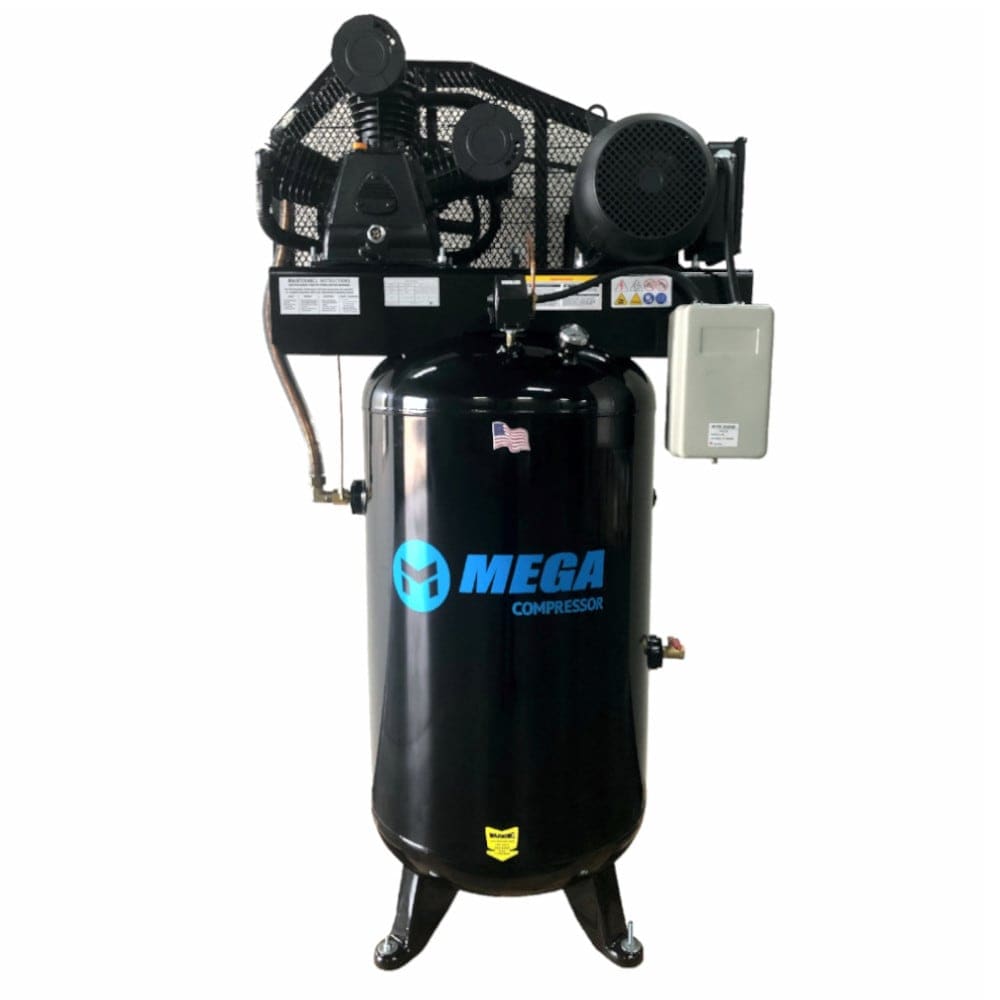 If you use a pneumatic sandblaster to remove paint or rust from vehicles, the Mega 80-gallon, two-stage air compressor is my runner-up pick. Providing 23 CFM of airflow at 90 PSI and a maximum 175 PSI, it offers plenty of power for a wide range of air tools. The W-cylinder design, one-piece cast iron crankcase, and cast-iron V-twin oil-lubricated pump minimize vibration, improve cooling, and extend unit life. So, blast away!
If you use a pneumatic sandblaster to remove paint or rust from vehicles, the Mega 80-gallon, two-stage air compressor is my runner-up pick. Providing 23 CFM of airflow at 90 PSI and a maximum 175 PSI, it offers plenty of power for a wide range of air tools. The W-cylinder design, one-piece cast iron crankcase, and cast-iron V-twin oil-lubricated pump minimize vibration, improve cooling, and extend unit life. So, blast away!
How We Picked the Best Automotive Air Compressors
When recommending automotive air compressors, we take five features into account.
Power
We start with the amount of power the air compressor can produce. There are two main characteristics of air compressor power: Cubic Feet per Minute (CFM) and Pounds per Square Inch (PSI). CFM refers to how much air the air compressor can deliver per minute (the volume), while PSI measures the force of the air. These two characteristics work together in a crucial balance to satisfy the needs of your application.
For example, if you’re using a tire inflator or an airbrush, then having high pressure is more important than high volume. The opposite is true for paint sprayers, nail guns, and other tools where you need more volume. Finally, both CFM and PSI are determined by the motor’s horsepower, which is another aspect of power we consider, along with the voltage requirements.
Reliability
In most cases, an automotive air compressor is a long-term investment, especially if you own a body or repair shop. That's why we make sure our recommended products are durable and dependable for years to come.
We start by looking at the overall construction. How well is the air compressor built and designed? Cast iron parts are a good sign that the manufacturer cares about durability. Features that reduce heat, moisture, and overall wear and tear are also important, so we check for things like aftercoolers and low motor RPMs.
Finally, we like to see protective features such as air filters that keep out contaminants and low-oil-shutdown in case of emergency. By taking reliability into account, we're making sure you won't need to buy a replacement compressor every few years.
Efficiency
We measure efficiency by how well an air compressor can deliver your air needs with minimal downtime, and at the lowest cost possible. Compressors that can do both effectively rank highly because they run almost continuously, don’t slow down your performance, and save you money.
One of the key measurements in this is an air compressor’s duty cycle, which represents how long it can operate before needing to cool down or refill the air tank. The higher the duty cycle percentage, the longer it can operate continuously without issue. A continuous-duty compressor is ideal because it's rated for non-stop operation, meaning no downtime for you.
Efficiency can take many forms in an air compressor, so we look at the whole unit to determine what features are in place to help bridge the gap between cost and performance. Motor and pump RPMs, tank-fill time, cooling technology, and other factors are all considered.
Noise
Sound level is an increasingly important factor, especially when it comes to traditionally loud piston air compressors. That’s why we reward quieter air compressors with a higher ranking. Today's best automotive air compressors are barely louder than the average human conversation. Besides being less bothersome, quiet air compressors help avoid hearing damage, which is a real concern when working with air tools all day.
It’s important to point out that the measurement of loudness in decibels is not standardized across the industry, and different manufacturers may test the loudness of their compressors differently. To combat the discrepancies, we typically consider brands that pledge to test their loudness consistently through organizations like C.A.G.I. or publish their testing standards so we can fairly compare them with other compressors. Of course, the best and most accurate way to know is to listen to as many compressors as we can in person and make determinations on our own.
Overall Value
Taking all the above criteria into account, along with price, leads us to an overall value appraisal for each air compressor recommendation. We don’t go by the “cheapest” air compressor alone because you’re going to get what you pay for, and we prioritize performance and quality. The sweet spot of affordability and performance is what we're after.
Automotive Air Compressor FAQs
How Do I Size an Air Compressor for My Automotive Shop?
When selecting an air compressor for your auto or collision repair shop, you need to: (1.) Determine how much air you need to run your tools (2.) Determine your pressure needs (3.) Confirm you have the correct electrical service.
Check your air tools and/or their manuals to determine their airflow (CFM) and pressure (PSI) requirements. Your air compressor will need to meet those requirements, but there are a few caveats. Not every tool in your shop will be used continuously or at the same time. For example, while you might use a sandblaster for most of the day, you might only need an impact gun for a quarter of that time. Take this into account when choosing a compressor so you don't oversize.
When it comes to electrical service, make sure you don't get a compressor that requires three-phase power if you only have single-phase power. You should also consider the extra power an air compressor will need when first starting up and ensure your electrical service can handle it. If you have any questions, just contact us, and I'll be happy to assist with your sizing!
Are Air Tools Better than Electric or Hydraulic Tools?
Using pneumatic tools powered by compressed air has several advantages over electric or hydraulic tools. When compared with electric tools, pneumatic tools are lighter, run cooler, and are typically more cost-effective. You're also less likely to get an electric shock. Compared to hydraulic tools, pneumatic tools are more portable, cost-effective, and easier to install and maintain. Although there are situations where electric or hydraulic tools will be more suitable, more and more auto repair professionals are using air power for these high-level advantages.
About Melissa
Melissa has been fascinated by air power since childhood when she would help her dad with hobbies using his old compressor. Years later, she would heavily use compressors herself when powering air tools for building theater set designs.
Her ability to fuse her fascination with air tools with her passion for theater exemplifies how compressors can play a role in almost any profession—from brewing to auto work and dentistry to heavy industry. After designing sets for eight years, Melissa worked as a flooring and window treatments manager for seven years before joining the Air Compressors Direct team.
Today, as the air compressor expert, Melissa sets the stage for customers’ success with a whole range of air applications. When not at work, she uses air compressors herself on various home improvement projects. Besides this, she enjoys spending time with friends and family, including her cats, outdoor activities, painting, gaming, and watching musicals.
You can count on Melissa to pull back the curtain on air compressors and answer all your questions and concerns!

